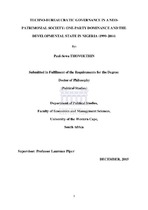Techno-bureaucratic governance in a neo-patrimonial society : one-party dominance and the developmental state in Nigeria (1999-2014)
Abstract
Most African states today are facing the serious challenge of socio-economic development. This is a problem not generated by the paucity of material and natural resources, but rather by challenges arising from mismanagement of these resources. Nigeria is in fact, a good example of a country in Africa facing socio-economic development challenges not as a result of lack of resources, but rather the mismanagement of abundant resources at its disposal. This mismanagement is associated with the culture of prebendal, clientelist and neo-patrimonial politics which have made it extremely difficult for technocrats and bureaucrats to contribute
adequately to the development of the country. In fact, as will be demonstrated in this thesis, technocrats in Nigeria are not allowed to occupy sensitive economic development positions for a sustained period of time and are never the driving forces in the formulation of socio-economic development policies and initiatives. In this country bureaucrats and technocrats have not been a stable force for
development- given the constant changes of these groups by the political leadership and the splitting of sensitive ministerial portfolios for political reasons. Instead, political offices are captured and used for the benefits of office holders and those of their associated factions, class and ethnic groups. This negatively affects the insulation of appointed technocrats and bureaucrats from vested political interests. Therefore, instead of appointing or employing technocrats and seasoned bureaucrats to occupy relevant positions, appointments and
employments are done in order for people to share from what is commonly referred to as ‘national cake’ in the parlance of Nigerian politics. Central to the argument of this thesis is that one-party dominance and authoritarianism does
not necessarily undermines techno-bureaucratic governance, as the cases of countries like Japan, South Korea, Taiwan, Singapore in Asia as well as Botswana and South Africa in Africa suggest, but when such system is associated with politics of prebendalism, clientelism and neo-patrimonialism techno-bureaucratic governance becomes difficult and the achievement of state’s led development becomes more daunting. This work therefore investigates why attempts at promoting prebendalism, clientelism and neo-patrimonialism under Nigeria’s one-party dominant system undermines techno-bureaucratic governance. It
also unravels how these have impacted negatively on socio-economic development of the country from 1999 to 2014. This study will contribute to the understanding of how the insulation of technocrats and bureaucrats from vested political interests can contribute to the development of the underdeveloped countries, using the developmental state argument as a basis of analysis.

